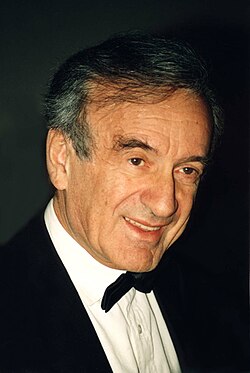Elie Wiesel Quote
I had many things to say, I did not have the words to say them. Painfully aware of my limitations, I watched helplessly and language became an obstacle. It became clear that it would be necessary to invent a new language... I would pause at every sentence, and start over and over again. I would conjure up other verbs, other images, other silent cries. It still was not right. But what exactly was it? It was something elusive, darkly shrouded for fear of being usurped, profaned. All the dictionary had to offer seemed meager, pale, lifeless.
Elie Wiesel
I had many things to say, I did not have the words to say them. Painfully aware of my limitations, I watched helplessly and language became an obstacle. It became clear that it would be necessary to invent a new language... I would pause at every sentence, and start over and over again. I would conjure up other verbs, other images, other silent cries. It still was not right. But what exactly was it? It was something elusive, darkly shrouded for fear of being usurped, profaned. All the dictionary had to offer seemed meager, pale, lifeless.
Related Quotes
Success and failure can both make you lose appetite and concentration, don't let it bother or over-excite you, just think them away as a mere thing that had just happened, and get along with your life...
Michael Bassey Johnson
Tags:
appetite, bad news, believe in yourself, bore, boring, excitement, failure, food, getting along, go on
About Elie Wiesel
Eliezer "Elie" Wiesel (September 30, 1928 – July 2, 2016) was a Romanian-born American writer, professor, political activist, Nobel laureate, and Holocaust survivor. He authored 57 books, written mostly in French and English, including Night, which is based on his experiences as a Jewish prisoner at Auschwitz and Buchenwald during the Holocaust.
As a political activist, Wiesel became a regular speaker on the subject of the Holocaust and remained a strong defender of human rights during his lifetime, advocating for justice in numerous causes around the globe, including that of Soviet Jews and Ethiopian Jews, South African apartheid, the Rwandan genocide, the Bosnian genocide, the War in Darfur, the Kurdish independence movement, the Armenian genocide, Argentina's Desaparecidos, Nicaragua's Miskito people, the Sri Lankan Tamils, and the Cambodian genocide. He was also an outspoken advocate for Israel and frequently weighed in to support the country during escalations of the Arab–Israeli conflict and throughout the Iran–Israel proxy conflict, while also hosting direct talks to facilitate the Israeli–Palestinian peace process.
Wiesel was a professor of the humanities at Boston University, which created the Elie Wiesel Center for Jewish Studies in his honor. He received a number of awards, including the Nobel Peace Prize in 1986. He was a founding board member of the Human Rights Foundation and remained active in it throughout his life. Wiesel was one of the main figures who spearheaded the establishment of the United States Holocaust Memorial Museum in 1993.
As a political activist, Wiesel became a regular speaker on the subject of the Holocaust and remained a strong defender of human rights during his lifetime, advocating for justice in numerous causes around the globe, including that of Soviet Jews and Ethiopian Jews, South African apartheid, the Rwandan genocide, the Bosnian genocide, the War in Darfur, the Kurdish independence movement, the Armenian genocide, Argentina's Desaparecidos, Nicaragua's Miskito people, the Sri Lankan Tamils, and the Cambodian genocide. He was also an outspoken advocate for Israel and frequently weighed in to support the country during escalations of the Arab–Israeli conflict and throughout the Iran–Israel proxy conflict, while also hosting direct talks to facilitate the Israeli–Palestinian peace process.
Wiesel was a professor of the humanities at Boston University, which created the Elie Wiesel Center for Jewish Studies in his honor. He received a number of awards, including the Nobel Peace Prize in 1986. He was a founding board member of the Human Rights Foundation and remained active in it throughout his life. Wiesel was one of the main figures who spearheaded the establishment of the United States Holocaust Memorial Museum in 1993.
